Knives
/ Blades
|
DESCRIPTION:
Danish Flake Blade
Click on picture for greater detail.
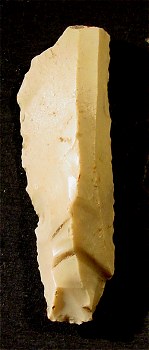 This artifact is a Danish Flake Blade and is made of a white / light
gray flint. There are three major parallel flake scars running the
whole length of this artifact. It has fine lateral retouches on
both the left and right
sides and the distal end has been carefully modified into a miniature
chisel. This piece measures 57mm by 17mm. This artifact is Danish
Mesolithic in age and has light old patina over its entire
surface. It was discovered in the early part of the 20 century.
This artifact is a Danish Flake Blade and is made of a white / light
gray flint. There are three major parallel flake scars running the
whole length of this artifact. It has fine lateral retouches on
both the left and right
sides and the distal end has been carefully modified into a miniature
chisel. This piece measures 57mm by 17mm. This artifact is Danish
Mesolithic in age and has light old patina over its entire
surface. It was discovered in the early part of the 20 century.
PRICE: $ 44.00 SOLD ITEM
NO: MS-37
|
|
DESCRIPTION: Upper Paleolithic Magdalenian
Blade
(Click on this picture for
a
more detailed view)
This
is an Magdalenian Blade from the Upper Paleolithic (about 19,000 to
about 9,000 yrs ago). This sharp narrow blade measuring 44mm by
13mm and is very thin, less than 4mm at its thickest point! This
artifact has a slight curve to it with some very fine retouches.
The material is a light brown flint common to the region. There is
a light coating of original sediment from the site left on the surface
of this piece. This artifact was discovered in the at the site of
La Madeleine, the name sake of the Magdalenian period, located in the Vézère valley, Dept. Dordogne.
PRICE: $ 58.00 Sold ITEM NO: MAG-06 |
DESCRIPTION:
Mousterian Naturally Backed Knife

Click on this picture for
a more detailed view
The definition of a naturally backed
knife is an unretouched flake or blade that has a sharp cutting edge on
one margin and a natural cortical surface on the opposing edge, Bordes
(1961:33). This artifact is made out of a flake that is a honey - cream colored chert.
There are retouches occur over the entire length of the apparent distal end
of this artifact. Some of the cortex was knocked off the proximal end
by the force of percussion when this tool was produced. It measures
70mm by 38mm and only 9mm thick! It is a very nice example of this
type of tool. It was discovered at a site in the Department
Dordogne, France. This piece dates to the Neanderthals of the Late
Mousterian (MTA) - Mousterian in Acheulian Tradition, dates to about
90,000 to 40,000 B.C.
PRICE: $ 78.00 Sold
ITEM NO: FPM - 10 |
|
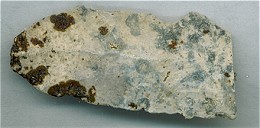
Click on picture for greater detail.
DESCRIPTION: Neolithic
Age Knife
This artifact is knife blade on a nicely patinated flint. It has
two distinct flake scar running approximately parallel to the two long
sides. It has some nice retouches along the edges of this piece
and a modified rounded tip. It measures 36mm by 17mm, and is very
thin only 3mm at its thickest. This stone artifacts was found just
off the shore of the island of Funen, Denmark. This was the site of an ancient
stone age settlement called "Mejloe", which is now covered by
the Baltic sea. The settlement dates to the Ertebölle
Culture: 5,400 to 3,900 B.C. The artifact were recovered
by divers in up to 20 feet of water, which gives it a interesting and beautiful
patina.
PRICE: $30.00 ITEM NO: DMK-1
|
|
DESCRIPTION: Knife
on a Levallois Flake.
This artifact is a Neolithic Age knife blade on a beautifully
colored patinated Levallois flint flake. There are a few fine
retouches along the two edges. The scar ridges are very distinct
on the dorsal surface. The bulb of percussion is evident on the
proximal end of this artifact. It measures 51mm by 27mm. This stone artifacts were found just
off the shore of the island of Funen, Denmark. This was the site of an ancient
stone age settlement called "Mejloe", which is now covered by
the Baltic sea. The settlement dates to the Ertebölle
Culture: 5,400 to 3,900 B.C. The artifact was recovered
by divers in up to 20 feet of water, which gives it a interesting and beautiful
patina. It still has some undersea growth attached to this piece.

Click on picture for greater detail.
PRICE: $ 28.00
Sold ITEM
NO: DMK-2
|
|
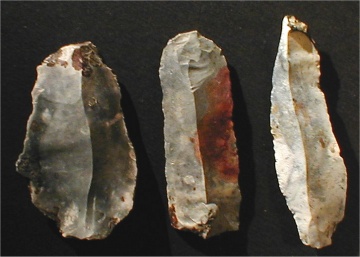
Click on picture for greater detail.
DESCRIPTION: Set of
Three Neolithic
Age Stone Artifacts were found just
off the shore of the island of Funen, Denmark. This was the site of an ancient
stone age settlement called "Mejloe", which is now covered by
the Baltic sea. The settlement dates to the Ertebölle
Culture: 5,400 to 3,900 B.C. The artifacts were recovered
by divers in up to 20 feet of water, which gives them a interesting and beautiful
patina. The first tool is a scraper 48mm by 30mm, 2nd is a
modified blade/end scraper 51mm by 18mm, and 3rd is a borer 58mm by 17mm.
All pieces show areas of fine retouches and distinct scar ridges.
PRICE: $75.00 (set of 3) SOLD ITEM NO: DM3-1A
|
DESCRIPTION: Neolithic
Age Knife
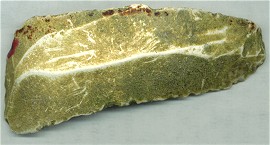
Click on picture for greater detail.
This artifact is knife blade is made of a white flint with a nice under
sea patina. It has fine lateral retouches on the left and right
side and the distal end has been carefully modified into a rounded
shape. This piece show traces of utilization. It has a
fair amount of green and red undersea growth attached to this
piece. It size is 62mm by 26mm at the Proximal end. This stone artifacts were found just
off the shore of the island of Funen, Denmark. This was the site of an ancient
stone age settlement called "Mejloe", which is now covered by
the Baltic sea. The settlement dates to the Ertebölle
Culture: 5,400 to 3,900 B.C. The artifact was recovered
by divers in up to 20 feet of water, which gives it a interesting and beautiful
patina.
PRICE: $ 30.00
SOLD ITEM NO: DMK-3
|
DESCRIPTION:
Danish Flake Blade
Click on picture for greater detail.
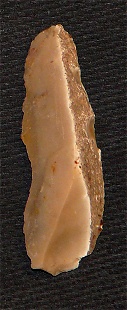
This artifact is a Danish Flake Blade and is made of a light
tan-gray flint. It has a few fine lateral retouches the left side. There
is cortex on the right side. This piece measures 55mm by 18mm. This artifact is Danish
Mesolithic in age and has light old patina over its entire
surface. It was discovered in the early part of the 20 century.
PRICE: $ Item Missing
ITEM
NO: MS-36 |
DESCRIPTION: Neolithic
Age Knife
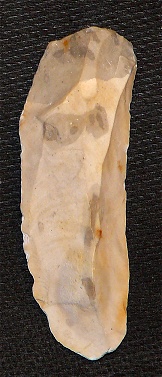
Click on picture for greater detail.
This authentic Danish
Neolithic Flint artifact is a long blade called a "two edged flint
knife" belonging to the very late mesolithic and very early neolithic
epoch about 4000 BC. This piece measures 72mm by 25mm and is from a
white/light tan flint with gray colored spots. This glossy flint knife
has fine lateral retouches on both the left and right sides. This
artifact is from an old German collection, and was found for on the
Island of Bogö, Denmark.
PRICE: $ Item Missing ITEM NO: BO-16
|
DESCRIPTION: Neolithic
Age Knife

Click on picture for greater detail.
This authentic Danish
Neolithic Flint artifact is a long blade called a "two edged flint
knife" belonging to the very late mesolithic and very early neolithic
epoch about 4000 BC. This piece measures 89mm by 24mm and is from a
white/light tan flint with gray colored spots, and has light old patina
over its entire surface. This glossy flint knife has fine lateral
retouches on both the left and right sides as well as some newer
workings. The Knife has a slight curvature to its back. This artifact
was found on the Island of Møn, Denmark. The island has an area of 84
square miles (218 square km) and lies in the Baltic Sea.
PRICE: $ Item Missing
ITEM NO: MO-3 |
DESCRIPTION: Neolithic
Age Knife
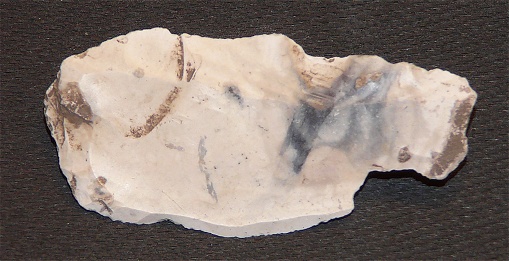
Click on picture for greater detail.
This artifact is a Danish Flake Blade and belongs to the very late
mesolithic and very early neolithic epoch about 4000 BC. This piece measures
70mm by 33mm and is from a white/light tan flint with gray colored
areas, and has light old patina over its entire surface. There are two
major parallel flake scars and one minor flake scar running the whole
length of this artifact. The Knife is quite thin, 5mm at its thickest.
This artifact was found on the Island of Møn, Denmark. The island has an
area of 84 square miles (218 square km) and lies in the Baltic Sea.
PRICE: $ 64.00 Sold ITEM NO: MO-4 |
Each artifact is unique and no two
pieces are quite the same, similar to snowflakes. So once an item is purchased,
there usually is not another artifact to replace it.
Contact us at: StoneAgeArtifacts@gmail.com
The contents of this site
under
Copyright © 2001-2023
Stone Age Artifacts
Gallery,
All Rights Reserved
Stoneageartifacts.com
Our web page does
not automatically collect specific information about
visitors.
Aggregate and summary statistics are collected only as a
measure of
our web site’s effectiveness.
|